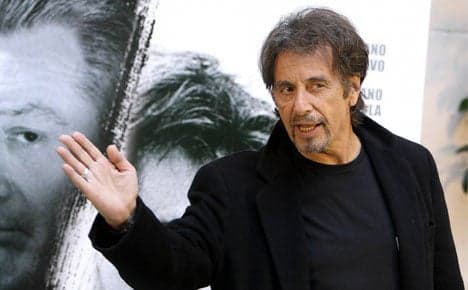Al Pacino pulls out of 'Nazi' play in Denmark

American acting legend Al Pacino has pulled out of a Danish stage adaptation of ’Hunger’ because of the Norwegian author’s enthusiasm for Nazi Germany.
Oscar winner Al Pacino, best known for playing Michael Corleone in The Godfather films and Tony Montana in Scarface, had signed up to be the narrator in the play ‘Hunger’, which was scheduled to premier at the Bergen International Festival in May 2017.
It would then go on to play at Copenhagen’s Aveny-T theatre and at Aarhus Theatre.
The play is based on the dark psychological novel by Norway’s Knut Hamsun, but Pacino pulled out of the project at the last minute because of Hamsun’s enthusiastic support for Adolf Hitler and Nazi Germany
"It is correct, he jumped at the last moment because he couldn’t come to terms with Knut Hamsun's support for the German occupiers and Nazism. We must respect that,” Jon Stephensen, Aveny-T’s manager, told BT.
Hamsun was a pioneer of psychological literature, and was an influence on writers as diverse as Franz Kafka and Ernest Hemingway.
However, during the Germany occupation of Norway, when he was 80 years old, he became a firm supporter of the German war-effort, getting to know many of the highest ranking Germany officers, including Joseph Goebbels.
After Hitler’s death he published an obituary in which he described the German leader as "a preacher of the gospel of justice for all nations”.
Aveny-T aimed to film Pacino over a day and then use 3D animation to project him onto the stage.
"It would have been really been great if it had succeeded,” Stephensen said. “I have several times in the process thought that I was dreaming. It would have been massive if he had come to Copenhagen.”
Stephensen held out hope that the project would still go on without Pacino’s involvement.
Comments
See Also
Oscar winner Al Pacino, best known for playing Michael Corleone in The Godfather films and Tony Montana in Scarface, had signed up to be the narrator in the play ‘Hunger’, which was scheduled to premier at the Bergen International Festival in May 2017.
It would then go on to play at Copenhagen’s Aveny-T theatre and at Aarhus Theatre.
The play is based on the dark psychological novel by Norway’s Knut Hamsun, but Pacino pulled out of the project at the last minute because of Hamsun’s enthusiastic support for Adolf Hitler and Nazi Germany
"It is correct, he jumped at the last moment because he couldn’t come to terms with Knut Hamsun's support for the German occupiers and Nazism. We must respect that,” Jon Stephensen, Aveny-T’s manager, told BT.
Hamsun was a pioneer of psychological literature, and was an influence on writers as diverse as Franz Kafka and Ernest Hemingway.
However, during the Germany occupation of Norway, when he was 80 years old, he became a firm supporter of the German war-effort, getting to know many of the highest ranking Germany officers, including Joseph Goebbels.
After Hitler’s death he published an obituary in which he described the German leader as "a preacher of the gospel of justice for all nations”.
Aveny-T aimed to film Pacino over a day and then use 3D animation to project him onto the stage.
"It would have been really been great if it had succeeded,” Stephensen said. “I have several times in the process thought that I was dreaming. It would have been massive if he had come to Copenhagen.”
Stephensen held out hope that the project would still go on without Pacino’s involvement.
Join the conversation in our comments section below. Share your own views and experience and if you have a question or suggestion for our journalists then email us at [email protected].
Please keep comments civil, constructive and on topic – and make sure to read our terms of use before getting involved.
Please log in here to leave a comment.